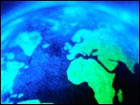|
Funds sidestep Argentina
|
 |
December 20, 2001: 7:24 p.m. ET
Emerging market bond funds are risky. But with some measured bets, they've been delivering.
By Martine Costello
|
NEW YORK (CNN/Money) - Is it happening again? In 1995 there was Mexico's peso crisis and then Brazil's currency collapse in 1999 -- both events sent shudders through global stock markets.
Now, Argentina's economy, once seen as a model for emerging markets, has collapsed. And after two days of rioting in Buenos Aires that have claimed 19 lives, and led to the imminent resignation of President Fernando De la Rua, one can only wonder why investors would even think about putting money in emerging markets.
Even so -- outside of Argentina -- this risky market segment is enjoying an upswing. International fixed-income funds in particular are one of the few bright lights in a terrible year on the performance charts.
While virtually every international stock fund category is in the red this year, overseas bond funds are making money. Emerging market bond funds are up an average of 10.4 percent, according to Morningstar, while the average U.S. large growth stock fund is down 23.5 percent.
Stick with good management
A good manager can make all the difference. While Argentina plays a major role in the J.P. Morgan Emerging Market Bonds Index, many emerging-markets fund managers bailed out of Argentina months ago as the country's economic situation worsened.
PIMCO Emerging Markets Bond Fund manager Mohamed El-Erian, for example, has been warning for 18 months that Argentina's economy was unraveling. The country was deep in a recession and taking on way too much debt, said El-Erian. The commodity market also was coming down, which hurt Argentina, a big exporter. Tolerance for "tough decisions" was eroding.
El-Erian's fund has delivered top long-term returns by avoiding such flameouts. He sold his stake in Argentina, focusing instead on government debt in Brazil, Mexico and Russia. "We looked at countries that were strong enough to avoid the contagion from Argentina," El-Erian said. The fund, with about $119 million in assets, is up 27.9 percent for the year through Dec.19, according to Morningstar.
They're not all like Argentina
Argentina is the one black eye on emerging markets this year. In fact, many countries have been making much-needed reforms and getting their economies on track. And their stock markets have been on the rise.
"I think what's happening is a lot of these emerging markets have matured, so a lot of speculative money has disappeared," said Joe Portera, manager of MainStay Global High Yield. The fund, tiny with about $20 million in assets, is up 13.3 percent as of Dec. 19.
MainStay focuses on the same three countries as the PIMCO fund, but invests in high-yield debt that is below investment grade. In high yield, managers take on more risk to invest in the lower-quality securities for (hopefully) higher returns. It owns mostly government bonds, and less than 10 percent of the portfolio is in corporate debt.
Portera said Brazil's central bank has done a good job of managing its currency, while Mexico has benefited from the North Atlantic Free Trade Agreement (NAFTA). Russia has done so well because of its oil boom that it's been able to pay off some debt ahead of schedule.
Elsewhere in the world, MainStay also has some holdings in the Phillipines, Malaysia, Algeria and Morroco. The PIMCO fund also has small holdings in Panama, South Africa, Bulgaria, Peru and Poland.
Looking ahead
While El-Erian expects Brazil and Mexico will remain strong heading into 2002, he said Russia will have a bigger job ahead. The "easy money" has been made in Russia, thanks to the higher oil prices. Now, it will depend on whether Putin can develop strong economic policies.
Brazil may face more volatility because of a presidential election in 2002, El-Erian said. President Fernando Henrique Cardoso has had a successful two terms but cannot run again because of term limits. And with Mexico, the question mark will be whether the U.S. economy rebounds.
Emerging markets have been going strong for the past two years, and it's one of the few bond markets in the world that hasn't corrected. "You've had a huge run," Portera said. "In the U.S. in the last month and a half, you've never seen such a volatile interest-rate environment. You haven't seen that in emerging markets."
That's why Portera said a pullback in emerging markets may happen in early 2002. "The volatility might be in hiding right now." 
* Disclaimer
Click here to send mail to Martine Costello
|
|
|
|
|
|

|

